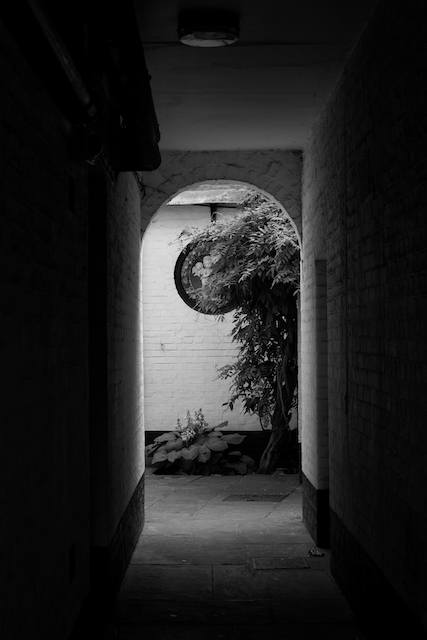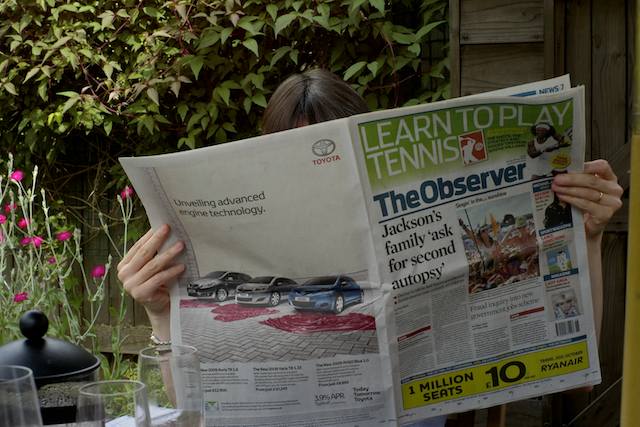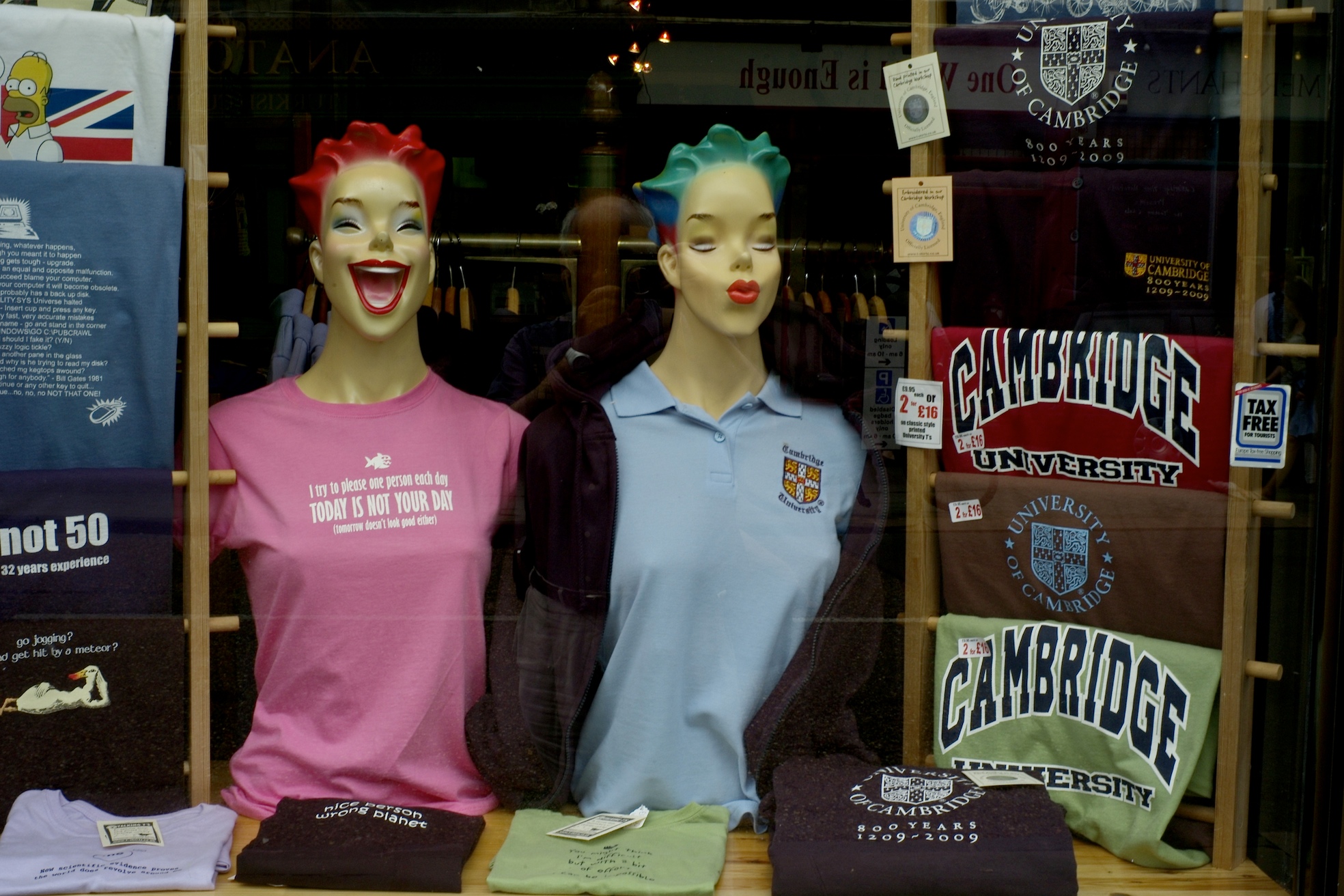To the external eye, Oxford and Cambridge seem very similar — the same glorious jumble of architectural styles, two apparently identical universities and their associated colleges woven into the fabric of their medieval towns, two institutions quaintly addicted to gowns and formal dining, etc. Yet the truth is that they are very different institutions. I’ve always thought that Oxford is much more well, exotic than Cambridge, which is an altogether more utilitarian place. The reasons for that are varied — Cambridge is more dominated by science and technology, for example, whereas Oxford is more dominated by the humanities. Oxford feels much closer to London, and especially to Westminster. And of course during the English Civil War, Oxford was the university that supported the King. Cambridge took a rather different view.
I was vividly reminded of the difference between the two places some years ago, when I was invited to George Steiner’s Inaugural Lecture after he was elected to the Chair of Comparative Literature at Oxford. The Chair was endowed, if I remember correctly, by the publisher George Weidenfeld — himself an exotic figure who turned up on the night with a gorgeous flame-haired creature on his arm who must have been half (or even a quarter) of his age. The lecture was held in the cavernous Examination Schools. I got there early, and watched in astonishment as the hall filled up with diamond-encrusted grandes dame of the kind hitherto seen only in the Court of the Tsars in the good old days. As I gaped, in sauntered the Professor of Irish History wearing a tastefully embroidered waistcoat, long hair flowing, hands languidly in pockets, for all the world like an escapee from an Oscar Wilde play. Not for nothing, I thought, does Brideshead Revisited open in Oxford.
All of this was conjured up by an acerbic review by Terry Eagleton of a recently-published collection of Enlightening: Letters 1946-1960 — the correspondence of the political philosopher Isaiah Berlin. Since Berlin was for many decades a central figure in 20th-century Oxford, Eagleton shrewdly opens his piece with a caricature of the university milieu in which the great man had thrived.
— the correspondence of the political philosopher Isaiah Berlin. Since Berlin was for many decades a central figure in 20th-century Oxford, Eagleton shrewdly opens his piece with a caricature of the university milieu in which the great man had thrived.
Oxford is one of the great hubs of the British establishment, but prefers to see itself as a haven for free spirits and flamboyant individualists. A don might endure the inconvenience of standing for hours in a pub with a parrot on his shoulder, simply to hear the admiring whisper: “He’s a character!” Eccentricity was valued more than erudition. In Berlin’s day, the colleges were full of men (and the odd woman) who mistook a snobbish contempt for the shopkeeping classes for a daring kind of dissidence.
Oxford thus had the best of both worlds. It was firmly locked into the circuits of power, wealth and privilege, yet it cultivated a cavalier indifference to them. Its colleges mixed luxury with monastic austerity. The place was worldly and lofty at the same time. Berlin himself was as much at home in the US Congress as in the senior common room. Dons could win themselves some vicarious power by churning out the political elite, while posing as genteel amateurs. The trick was to talk about Hegel in the tones of one talking about Henley regatta.
Eagleton is immune to Berlin’s exotic charm, preferring to see him as a reactionary masquerading as a liberal intellectual. From this caustic perspective, Oxford was “a perfect stage” for a man whose
taste for the off-beat and idiosyncratic served to disguise a deeper conformity. He shared with Oscar Wilde and TS Eliot the outsider’s ferocious hunger to be accepted (he was the first Jew to be elected to an All Souls fellowship) and turned himself into a deadly accurate parody of the English establishment, all the way from his well-tailored waistcoats and quick-fire donnish gabble to his careless habit of overlooking western political crimes while denouncing Soviet ones.
Above all, Berlin was a flattering presence among his peers. He spoke learnedly of obscure European thinkers unknown to his colleagues; yet he spoke of them in ways they could thoroughly approve of. Far from threatening their own provincial values, his cosmopolitanism seemed to confirm them. His Oxfordian delight in the “gay” and “amusing”, favourite terms of praise in these letters, lent him the air of a nonconformist when it came to the staid, unstylish middle classes. But it was also his entry ticket to the world of the Rothschilds, Sackville-Wests and Lady Diane Coopers, in whose patrician presence his critical faculties could be quickly blunted.
Eagleton sees Berlin as “an amphibious creature, a high-society intellectual”. In English culture, he writes,
this is not as self-contradictory as it sounds. What Oxford did, with its Hellenistic sense of human existence, was to provide some high-sounding rationales for upper-class frivolity. It was agreeable to know that in popping the champagne you were vaguely in line with some ancient Greek thinker or other. In yanking each other into bed, Oxford men could feel they had the glories of ancient civilisation in there with them.
Berlin, Eagleton writes, “was not only a compulsive chatterer; he was in a chattering class of his own. These letters are great splurges of urbane speech, which at times come close to stream-of-consciousness mode. Fragments of political philosophy blend with upper-class gush (‘divine’, ‘delicious’, ‘adorable’).”
I’ve always found it difficult to square the image of Berlin one obtains from the chronicles and memoirs of the Oxonian smart set of his time (Bowra, Trevor-Roper, Raymond Carr, Elizabeth Bowen, David Cecil, et al) with the image of him as one of the 20th century’s most influential political philosophers. He famously wrote very little (and was only rescued from literary oblivion by the efforts of Henry Hardy, the graduate student who collected all his various small pieces and edited them into collections of essays). I associate him only with two Big Ideas: the fact that we need to accept that some of our values will always and inevitably be contradictory (thereby forcing us to make moral choices); and his famous essay on Tolstoy’s view of history in which he divides the world into hedgehogs (who know only one big thing) and foxes (who know many little things).
As you can see, I’m a fox.




